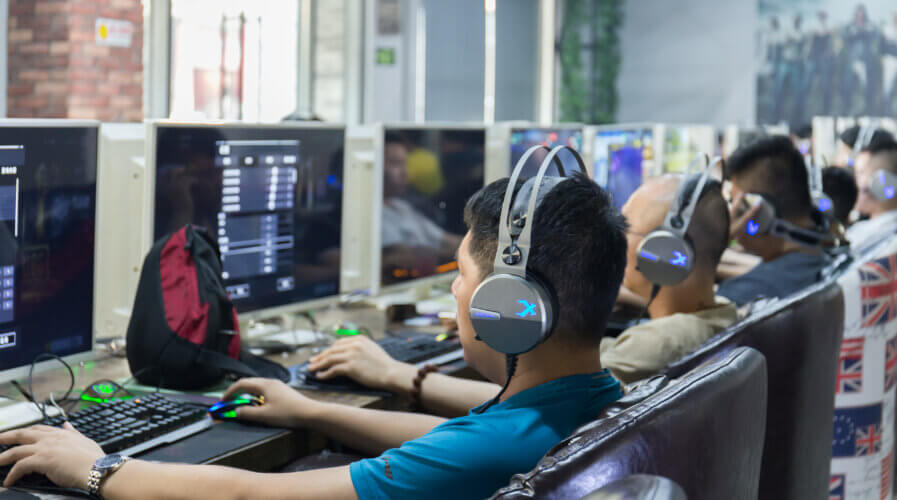
China approves new games amid regulatory shifts. (Source – Shutterstock).
China greenlights 105 online games in the wake of draft curbs
- China greenlights 105 new games, reflecting a strategic shift amid regulatory challenges.
- New gaming rules in China trigger market upheaval, followed by industry recalibration.
- China’s gaming sector adapts to evolving regulations, signaling a dynamic future.
China’s media regulatory body recently approved 105 new online games, signaling its support for the gaming industry. This comes after earlier proposed restrictions led to significant financial losses for investors in leading gaming companies on December 29.
China previously introduced draft regulations to reduce excessive online gaming expenditures. These guidelines were part of the Communist Party’s efforts to maintain control over the digital economy.
The announcement of these draft rules dramatically impacted the stock prices of major game developers like Tencent and Netease. On December 29, their shares plummeted, resulting in a loss of billions of dollars and negatively affecting Chinese stock market indices.
Major developers hit by market turbulence
Tencent experienced a massive selloff of approximately US$80 billion following the unexpected introduction of the new gaming restrictions. This reignited concerns about the Chinese government’s potential crackdown on the country’s significant internet sector.
The primary gaming regulator published draft rules to limit practices that encourage excessive player spending and online time. These included spending caps within games, bans on rewards for frequent logins, and prohibitions on content that violates national security.
These broad restrictions surprised the industry and investors, especially before Christmas. They were reminiscent of the harsh tech-sector crackdown in 2021, which saw sudden restrictions on various sectors and significantly impacted companies like Ant Group Co. and Alibaba Group Holding Ltd., as well as the online education industry.

China’s new gaming rules ban rewards for daily logins to curb addiction. (Source – X).
The recent regulations, both vague and comprehensive, left investors unable to predict their implications. Many developers and designers expressed frustration and confusion, especially over the unspecified cap on player spending. Chinese games, which often encourage players to invest in their avatars, are a primary revenue source for companies like Tencent.
On a WeChat feed, Tencent investors and employees criticized the rules as “irrational.” Cai Wensheng, a well-known venture capitalist and co-founder of Meitu, even remarked on WeChat, “A policy kills an industry,” before deleting the post. Adding to the confusion, on December 29, the gaming regulator approved 40 new online gaming titles for distribution in China.
Even though Beijing’s focus remains on gaming, these regulations could fundamentally change the traditional “freemium” model, where users download games for free but spend heavily on them to make progress. This model has been scrutinized in other countries like Japan for its addictive nature.
Lightstream Research analyst Mio Kato believes these developments in China could have broader implications, potentially influencing other countries to take similar actions against mobile games and social media addiction.
Tencent’s games vice president, Zhang Wei, said these regulatory changes wouldn’t fundamentally alter the company’s business model or operations. After the market closed, Tencent announced a buyback worth HK$1 billion (US$128 million) on December 29.
The broader implications for China’s gaming industry
Despite the recent regulations, there seems to be a thaw in Beijing’s stance towards the gaming sector. Officials had promoted esports as part of the post-Covid economy revival, with Xi Jinping attending the opening ceremony of the 19th Asian Games, which included professional gaming.
In December 2022, Tencent received approval for several major game releases, indicating a potential easing of the crackdown on Big Tech. Tencent and NetEase are now competing fiercely in the gaming market, particularly in the “party royale” genre.
According to CNG, China’s gaming market was expected to grow 14% to 302.9 billion yuan (US$42.4 billion) in 2023, reversing a decline from the previous year.
The turnaround in the relationship between China and games
China’s National Press and Publication Administration issued guidelines prohibiting online games from offering incentives for daily logins or purchases, among other restrictions. Recently, the Administration expressed support for the gaming industry’s prosperity and healthy development through a statement on its WeChat account. This was evidenced by the approval of games like Tencent’s Counter War: Future and NetEase’s Firefly Assault.
The Press and Publication Administration announced that in 2023, 1,075 game version numbers were issued, with 977 being domestically produced and 98 imported. The Administration also highlighted a 2023 China Game Industry Report showing that sales revenue for the domestic online games market exceeded 300 billion yuan (US$42 billion) in 2023, with a player base of 668 million.
The Game Working Committee encouraged member units to seize this opportunity to release more high-quality products to promote the online game industry’s high-quality development and contribute to cultural prosperity and development in China.
In recent years, China has implemented various measures against the online gaming sector. In 2021, regulations limited the amount of time children could spend on games to just three hours a week, citing concerns about addiction. While approvals for new video games were suspended for around eight months, they resumed in April 2022 as part of a broader relaxation of the crackdown on the technology industry.
These developments reflect the Chinese government’s ongoing efforts to regulate and shape the online gaming industry in line with its broader economic and social objectives.
READ MORE
- Safer Automation: How Sophic and Firmus Succeeded in Malaysia with MDEC’s Support
- Privilege granted, not gained: Intelligent authorization for enhanced infrastructure productivity
- Low-Code produces the Proof-of-Possibilities
- New Wearables Enable Staff to Work Faster and Safer
- Experts weigh in on Oracle’s departure from adland




